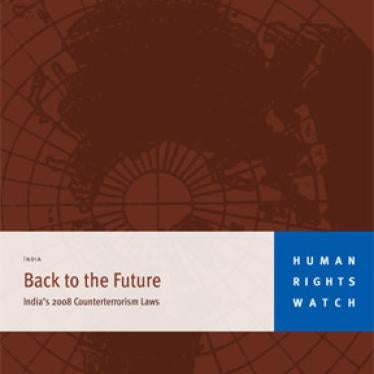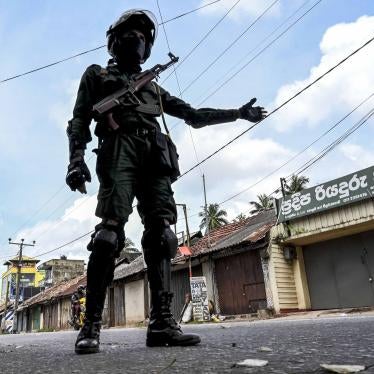(New York) - The Indian government should revise its draconian 2008 amendments to counterterrorism laws that can lead to serious violations of human rights, Human Rights Watch said in a new report released today. The amendments mirror previous counterterrorism laws that had been allowed to lapse or were repealed because of the abuses committed under them, Human Rights Watch said.
The 20-page report, "Back to the Future: India's 2008 Counterterrorism Laws," is an analysis of the amendments to the Unlawful Activities Prevention Act (UAPA), enacted after the November 26, 2008 attacks on Mumbai that killed 166 people and injured over 300. Comparing them to previous legislation, the report finds that the new amendments contain provisions that are also likely to result in abuse of terrorism suspects and the infringement of basic due process rights.
"The Indian government needs to protect its citizens from terrorist attacks, but laws that open the way to human rights violations are counterproductive," said Meenakshi Ganguly, South Asia director at Human Rights Watch. "Abuse of previous counterterrorism laws all too often alienated communities and served as a recruitment tool for militants."
The Terrorist and Disruptive Activities (Prevention) Act 1985 was allowed to lapse in 1995, and the Prevention of Terrorism Act 2002 (POTA) was repealed in 2004 because both laws had led to the arbitrary detention, torture, enforced disappearance, and extrajudicial killing of numerous terrorism suspects and others, including Sikhs, Muslims, Dalits, and citizens of India's northeastern states.
The 2008 amendments contain the same vague definitions of terrorist activity and unlawful association as these previous laws. With the amendments' harsh penalties and wide powers of detention and investigation, the government can misuse this law to persecute political opponents or authorize repressive measures against minority groups and targeted populations. Human Rights Watch is particularly concerned that the amendments will be invoked during security operations against Maoist armed groups, known as Naxalites, to target tribal groups and human rights defenders.
The report contains detailed recommendations to the Indian government to revise the 2008 amendments to prevent abuses. In particular, Human Rights Watch calls on the Indian government to revise the definition of terrorism and ensure that restrictions on organizations respect the right to freedom of association under international law. Human Rights Watch also urges the repeal of provisions such as those authorizing pre-charge detention for up to 180 days, limitations on bail, presumption of guilt in certain circumstances, and overly broad search, seizure, and arrest.
The 2008 amendments allow the authorities to classify as "terrorist" a broad range of peaceful opposition movements arising from regional, ethnic, or religious grievances. The amendments permit the security forces to conduct searches and make arrests that otherwise would be unlawful under Indian law, and to compel information from third parties without a court order or judicial warrant, based only on the "personal knowledge" of the relevant officer. The law also permits detention without charge for up to 180 days, including 30 days in police custody, without proper safeguards. These violate international protections against arbitrary detention.
Human Rights Watch said that the National Investigation Agency Act (NIAA), which allows for the creation of a specialized federal police agency, is another source of concern. The agency is authorized to investigate terrorism and other national-security crimes. The law also authorizes the creation of special courts that have broad powers to hold closed-door proceedings with secret witnesses.
"Indian security forces are seldom held accountable for their crimes," Ganguly said. "Providing them the dangerous powers under these amendments opens the door to further injustice."
A number of Indian states are facing violent protests or armed conflict, placing some of the country's poorest and most marginalized communities at risk. Muslim and Hindu extremist groups have indiscriminately targeted people in bomb attacks, Maoists have killed alleged informers and ordinary citizens in buses and trains, and armed separatists in Jammu and Kashmir, Manipur, and Assam routinely carry out attacks that kill or wound civilians.
"Local populations are often caught in the middle of a conflict, forced to support armed groups in their midst, and then put at risk of arrest and torture by the security forces for aiding the enemy," Ganguly said. "The recent amendments tighten the vise even further."







